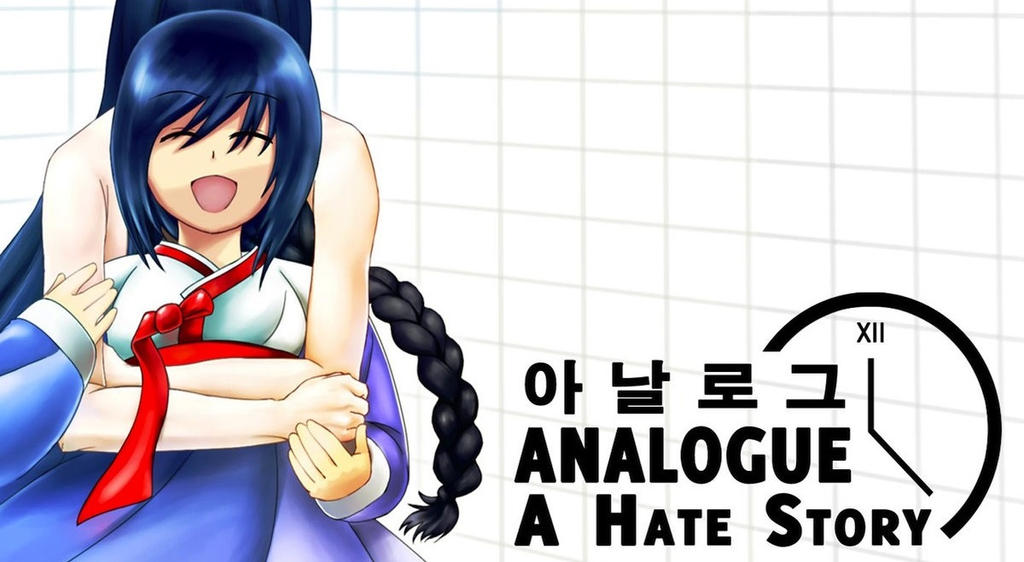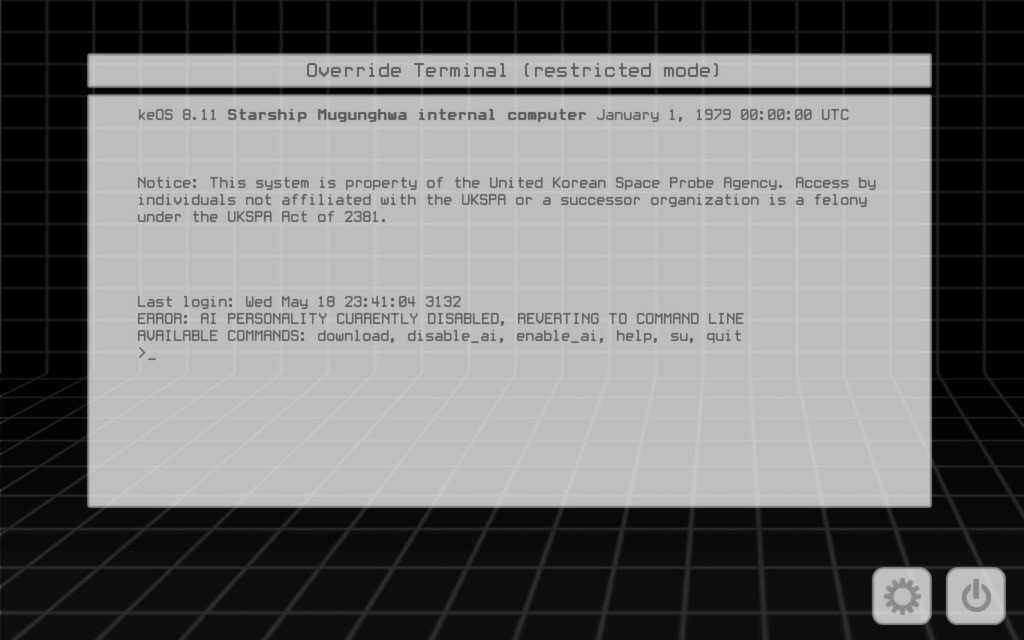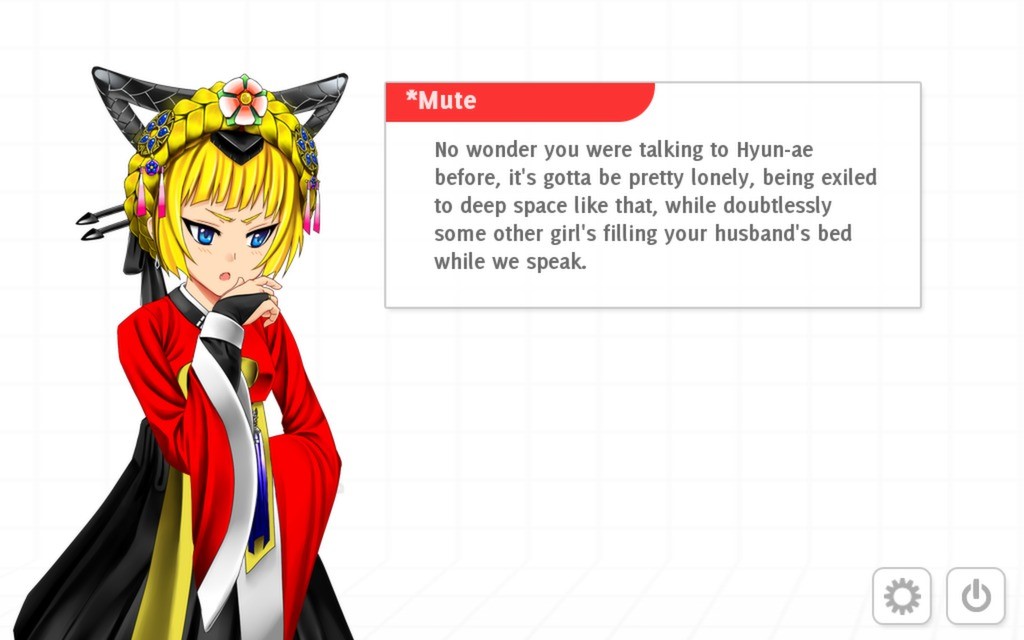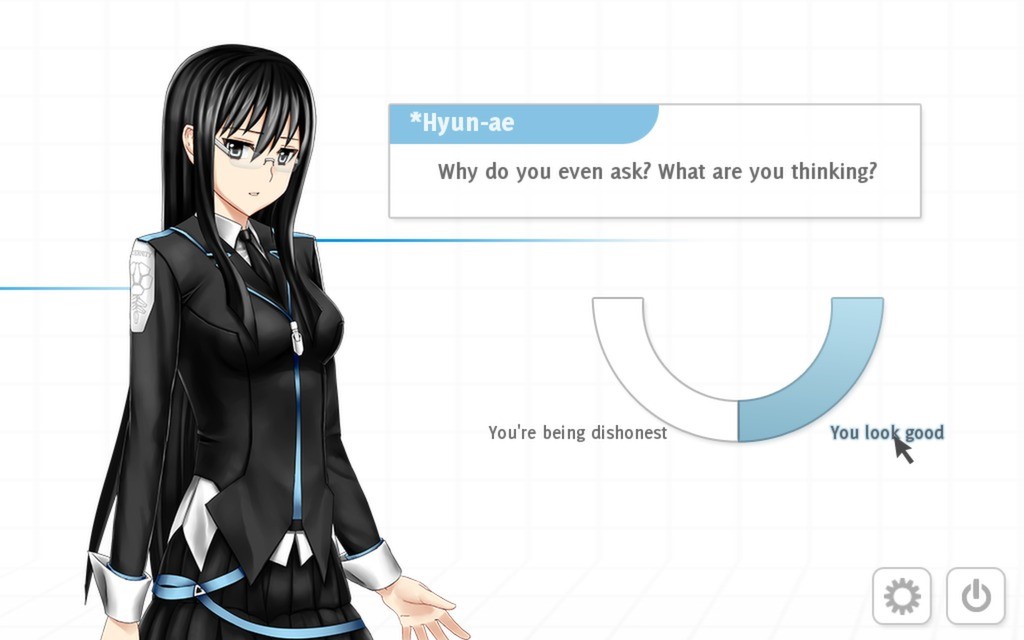
This review was originally published on Fuwanovel Forums on December 1st 2017.
Analogue: A Hate Story is not a title that necessarily has to be „discovered” or that wasn’t properly appreciated in the time when it came out – among all the VNs developed in the West, it might as well be the one most highly regarded and popular within “proper” visual novel fandom, at least before the recent appearance of Doki Doki Literature Club. Still, it’s a very important game for me personally and for the idea behind this blog, for two reasons. First, Analogue was the first visual novel I’ve ever played and a piece of media that affected me emotionally and intellectually like few other before it or since. It was not only stuck in my head for a long time, as a vivid and emotionally striking memory, but maybe even left a lasting mark on my way of thinking and my moral stances. Second, it’s a perfect example of the power of VNs as a formula that even a single person, or a tiny team can use to create something remarkable and touching, given enough effort and talent. Before I go into details of the game, I have to mention a very good review by Meru that was already featured on Fuwa frontpage – I agree with most points there and encourage you to check it out, but beware, it’s somewhat spoiler-ish. As the game relies heavily on its plot twists, I myself will try to reveal as little of the story as possible.

The game does an amazing job of creating a unique climate and placing its UI and storytelling techniques within the setting – even explaining why you only use preset dialogue lines for communication.
So, what is Analogue about and why I find it so special? The game focuses on an unnamed protagonist, sent on a salvage mission to a derelict colony ship, which was lost in space many centuries earlier. On the ship, apparently devoid of any life, the player encounters two AIs and attempt to uncover the mystery behind the crew’s disappearance – mostly following a story of the Pale Bride, a terminally ill girl that was locked in a stasis pod by her parents, in hope that the future technology might bring a cure for her condition, only to be awakened in a time of dramatic social and technological regress. Everything is presented through minimalistic, but thematically fitting user interface – you spend most of your time going through computer terminals and databases, interacting from time to time with the AIs in charge of the ship, but mostly reading through various logs and messages. While this might not sound like the most exciting concept, it really fits the main premise of the story and let you immerse yourself in the role of an astronaut studying a space-travel disaster-site.
Still, what truly makes this apparently-dull formula engaging, especially in the first playthrough, is the quality of the writing and the emotional impact of the stories told. The game’s author, Christine Love, is primarily a writer and the level of her craftsmanship shows in pretty much every piece of text available in the game. While it isn’t especially long (shouldn't take more than 6-7 hours to fully read through), Analogue manages to create a great main intrigue and a pretty significant cast of memorable characters, both in the historical records of the ship's databases and in the form of two AIs that the player interacts with. While the setting itself, extremely oppressive and patriarchal, might feel like a bit of a stretch – we are only told that it’s an effect of unknown disaster which led the whole ship out of its course and into endless drifting on a remote star system, not why its social order evolved in this direction – it works very well as a plot vehicle.

The "conformist" A.I., *Mute, while foul-mouthed and unsympathetic, is not simply a representation of patriarchy or a stock villain – she’s a deeply flawed, but interesting character, providing many meaningful insights and interactions.
Here there’s a need for a bit of an elaboration – the game isn’t shy about its ideological stance and the intent of being not only a story, but a piece of social commentary. Pale Bride’s story is one of a dramatic clash between modern values and lifestyle, and extremely patriarchal, feudal society styled after medieval/early modernity Korea. The values and common sense ideas of that era are presented through *Mute, a security AI which might use female form, but in her opinions and commentary shows the deeply rooted misogyny and oppressive nature of the ship’s regressed society. Still, just as most characters in the story, she isn’t simply a villain – she’s a product of a specific social order and not only can show sympathy and devotion to other people, but reacts in a humane way when confronted with information that defies her expectations. While some people try to reject Analogue as a propaganda piece, it doesn't show a black-and-white picture, but points out the tragedies connected to this kind of oppressive social order and the situation of those that don’t fit into its norms. It’s a feminist game through and through, but not an ideological pamphlet – it’s not made to hamfist certain ideas into your head, but to make you think and empathize with those put in similar situations as some of the characters in the story. And it wouldn't be effective at that if it didn't strive, and succeed, at being an impressive piece of literary fiction, that feels genuine and inspired in its storytelling.

The game manages to create a lot of emotional tension and occasionally shock the player – when the main mysteries are revealed, it’s very hard to stay unaffected.
Of course, Analogue is far from being a perfect game. The database structure can be somewhat bothersome, often not giving any clear indications what you have to do to unlock additional logs and progress through the game (in my first playthrough, 3 years ago, I was stuck like that 2-3 times, frantically browsing the messages and looking for what interaction with the AI I’ve missed). There’s also one-timed puzzle-sequence, which for me felt extremely confusing and more or less unapproachable without a guide. Endings are very much a mixed bad, the primary ones (1&2) being in my opinion extremely impactful, while other ones often leave you without much to think about. Also as I’ve already mentioned, the visuals are fairly basic and music also rather serves as a background for your data-sorting activities than stands out in any way. One could say that Analogue prioritizes plain text over any other kind of storytelling technique available to VNs and to some extent I would have to agree.
Still, in my opinion it’s a remarkable and in many aspects unique experience, that every VN fan out there should try for him/herself. It will always stay as a “10” in my VNDB listings not because it is a “perfect game” (probably not even close to it), but because of the huge and lasting impressions it left me with – the kind of experience that makes it hard to sleep even after “refreshing” the game years later, but which you definitely don’t regret having.
Final verdict: 4,5/5
Pros:
+ A really engaging, impactful main story
+ Unique, well-crafted setting
+ Immersive UI and storytelling
Cons:
- (For some readers) a strong, easily identifiable ideological message
- Main database is sometimes hard to navigate and progress through
- Confusing timed sequence that catches you by surprise
- Limited replayability – only two marginally different story routes
VNDB page
Buy Analogue: A Hate Story on Steam

No comments:
Post a Comment
Note: only a member of this blog may post a comment.